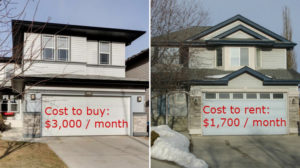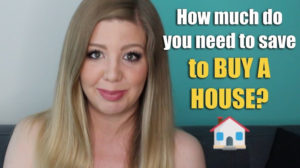Rent is cheap, interest rates are rising and some see better investments with less risk

If all goes well, the arc of early adulthood is supposed to go: graduate, get a job, buy a house.
We’re told this is the formula for success. With each milestone you reach, friends and family pat you on the back. And by the time you reach the final step, you know you’ve really made it. You’re a homeowner now. Congratulations.
Welcome to the club.
But wait. Some smart young people in Calgary with more than enough money to buy are opting to rent. Yep. Rent. Or, as your uncle might say, “paying someone else’s mortgage.”
Are they crazy? Or do they know something the rest of us don’t?
The reasons for renting, by choice
The decision to rent or buy depends entirely on your personal circumstances.
If you’re sure you’ll live in the same place for more than a decade and are confident housing prices will outpace inflation, the standard arc of adulthood will probably fit with your life. In that case, buying can certainly be a good option.
But there is a risk, too. Taking out a mortgage might make your mom happy, but a lot of things will have to go right for you to make a fraction of what she made on her first home. And if just one or two go wrong, you might find yourself trapped.
Past returns are no guarantee of future returns. A cold, hard look at the numbers reveals how the scales of risk and reward can tilt in a different direction. It may run counter to conventional wisdom — the orthodoxy of ownership promulgated by governments, banks and realtors. It may prompt disapproving sighs from family members. It may even bring Tinder dates to an abrupt end.
But let’s explore the reasons you maybe, just maybe, might want to rent.
Some quick numbers
It all comes down to math.
Prices for a typical, detached house in our city have hovered around the $510,000 mark for the past few years. So says the Calgary Real Estate Board.
To buy that house today would likely cost you about $3,000 per month. That would cover the mortgage, property taxes, insurance and maintenance costs. (We’ll talk more about these estimates later on.)
If you wanted to rent a similar home, meanwhile, you can likely find something for $1,700 a month in the current market, which has seen vacancy rates increase fourfold during the downturn.

Right there, that’s $1,300 you’d save by renting — each and every month.
Add that to the tens of thousands of dollars that you don’t have tied up in a down payment, and now you have some serious capital to feed into in any number of other investments.
This is at the core of the calculations some young people have been making. They’ve considered the more diverse investment opportunities that renting offers, and they’re attracted to the flexibility and reduced exposure to market fluctuations. So they’re in no hurry to buy.
The math ‘just doesn’t work out’
Bridget Casey is a 32-year-old entrepreneur with an MBA in finance from the University of Calgary. She recently went through one of those life changes that often prompts people to buy a house.
She became a mom.
“I had a positive pregnancy test in hand only four days after I had moved into a new one-bedroom apartment,” she wrote last April in her popular financial literacy blog, aimed at people in their 20s and 30s.

Casey had been saving — a lot — in preparation to buy. She had a hefty down payment to plunk down, but had been in no hurry to pull the trigger. As far back as 2015, she had her doubts, which she detailed on her blog.
Three years later, even as a new mom, she’s still choosing to rent.
“Now that I have a baby, I was considering moving somewhere more permanent,” she said. “But every time I do the math, it just doesn’t work out.”
Danny Haines has done the math, too. He figures it’s 40 per cent cheaper for him to rent.
The 30-year-old engineer, who also has an MBA, bought a condo in Edmonton about 10 years ago, which he said he roughly broke even on, once realtor fees and other closing costs were paid. But now that he’s moved back to Calgary, he sees renting as the better option.
He’s taking the money he saves and socking it away in a variety of other places. That includes some money in real estate investment trusts, but only as part of a diversified portfolio.
“I mean, that’s the first thing you learn in any business class,” he said. “Tying up all your funds in one asset is a pretty silly idea. You’re super exposed to any risk and fluctuation in the market.”

Putting all your eggs in the real estate basket also comes with what’s known as opportunity cost. This is a theoretical concept, but it translates into real money.
In Haines’s case, buying a home would have meant missing out on the opportunity to invest his additional cash flow in the stock market. And, he says, those investments have done “really well” over the past couple of years.
“I’m sure they’re doing a lot better than many people’s homes,” he said.
This also keeps him adaptable to changing situations. So when he was laid off from his construction management job in 2015, instead of fretting over how to cover the next mortgage payment, he travelled and worked in New Zealand for a year. Renting didn’t just free up his capital, it freed up his life.
But Haines admits there is another cost to renting — a social one. He says his decision is a hard sell to some family members, especially those of an older generation who have done well in real estate. And then there’s the sideways glances from people his own age, too.
“It’s definitely come up on a first date: ‘Oh, you rent this place? How much money do you make? This is weird.'”
Generational divide
It may be weird now, but it’s becoming more common. Young renters are still in the minority in this city, but only just barely.
Home ownership rates have been on the decline for the past decade among people under the age of 35. In the 2016 census, it was down to just 50.6 per cent.
Among the baby boomer and older generations, by contrast, the rate has increased slightly to 83.1 per cent. Clearly, there’s little debate in that crowd about the wisdom of home ownership. And understandably so.
“They kind of have a backwards-looking perspective on it,” said Max Fawcett, a former Calgary resident who has written extensively on what he’s described as the religion of real estate.
“If you look backwards over the past 30 years, buying has been a pretty good choice. But that doesn’t mean that buying is going to be the right choice going forward.”
The problem, he says, is prospective buyers are presented with an “imbalance” of information.
It comes from realtors and bankers with an incentive to sell homes. It comes from well-meaning parents who want their kids to benefit from the same returns they’ve enjoyed. It comes from governments who entice first-time buyers with the ability to borrow down payments from their RRSPs and claim tax credits for home renovations.
“It makes it difficult for people to accurately assess the information that’s in front of them,” Fawcett said.
And that task is already hard enough.
Assessing the info
Trying to compare the costs of renting versus buying — along with the expected returns on your choice of investment — is enough to make even the most mathematically inclined person’s head swim.
Fortunately there are some online tools you can use. But they, too, can be confusing.
One of the more complicated but powerful tools comes from a brokerage called Mortgage Intelligence. Plug in a bunch of numbers and it’ll show you how long it would take for a home purchase to break even against investing your down payment and monthly savings as a renter.
There’s also an interactive tool from the New York Times that’s easier to understand, with one complicating factor. You have to be sure to set your “marginal tax rate” to zero in order for the calculations to work in a Canadian context. That’s because Americans have even greater government incentives to buy homes — they can deduct their mortgage interest and property taxes from their income taxes.
Use these tools with the numbers from our typical detached house, add in a few assumptions, and you’ll see it’s actually quite close between renting and buying.
Let’s give it a try.
Plug in a three-per-cent mortgage rate, a 20-per-cent down payment, a lower-end estimate (1.5 per cent of the home value) for maintenance costs, and assume a modest annual return of two per cent for both house prices and any investments you’d make as a renter, and the math pretty quickly comes out in favour of buying. Cool.
But tweak a couple of variables and things change dramatically.
Boost the interest rate on your mortgage by a single percentage point and suddenly it takes twice as long for the purchase option to be more profitable. Reduce the expected gain in house prices by one percentage point and renting looks better for two decades or more. Assume a one percentage point higher return in the stock market and the math tells you to rent forever.
The question then becomes: How big of a bet are you willing to place on real estate?
Guessing at the future
If you buy today and prices grow by three or four per cent every year, then sure, you can sell in five years and likely come out ahead compared with renting. But what if they grow by only one per cent? What if they fall slightly? What if they crash?
If it takes 10 or 15 years for your purchase to come out ahead, what will interest rates look like by then? What are the chances of a leaky roof, a blown furnace, a special assessment from your condo board or some other major repair bill coming your way during that time?
On the other side of the coin: Renting is cheap now, but prices have begun to edge up. Will they outstrip the cost of buying?
Of course, none of us has a crystal ball. You can do your best to make an informed decision, but at the end of the day, it’s never a sure bet. For the young people we’ve heard from, though, it comes down to spreading out the risks and not rushing into a long-term commitment.
“I do think smart young people value keeping their options open,” said Fawcett.
“They know that they can buy whenever they want. That’s the great thing about being a renter … you can buy next week if the numbers change and the math starts to work in your favour or your life situation changes.”
In the meantime, they’re resisting the pressure to purchase. They’re more than happy to put away the money they save by renting, while enjoying the freedom and flexibility that brings. Some day, they may choose to buy a home. But for now, they won’t be swayed by their folks, their first dates or the fear of missing out.


